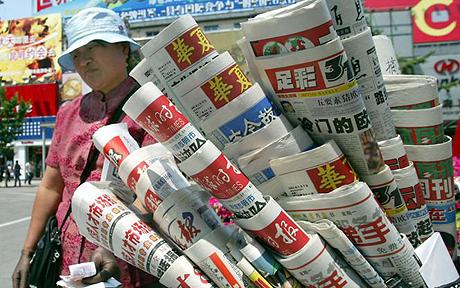A crackdown on alleged extortion by journalists, in particular the 21st Century Media Company, has led the Beijing government to set up a commission targeting “immoral” practices by the media. From Laura Zhou at South China Morning Post:
The media ethics commission – comprising newspaper executives and reporters, media academics and spokespeople of government departments – was formed to place “more emphasis on ethics in the media industry of the city”, the Beijing Times reported.
The commission, overseen by the municipal propaganda department, will supervise all employees from government-approved media outlets based in the capital.
Any malpractices, including false reporting, paid hack pieces and vulgar advertisements can be reported to the commission, the report said.
”Tightening supervision and self-regulation of the media industry is part of the central government’s efforts [to push forward the] rule of law and fight corruption … and to build a good media image to the public,” Zhai Huisheng, the Communist Party secretary of the China Journalists’ Association was quoted as saying during its first meeting yesterday, the Times reported. [Source]
While the allegations against 21st Century Media Company link journalists to extortion of businesses, Chen Heying of the Global Times reports that a government censor has been sentenced to ten years for accepting bribes:
Li Ning, a censor with the television department at the State Administration of Press, Publication, Radio, Film and Television, received his sentence on August 11 for taking bribes of 300,000 yuan ($48,859), beginning in 2006 when he took the position, Beijing-based Legal Mirror reported on Wednesday.
“It is common to bribe censors. The watchdog issued so many complicated regulations on TV series that [companies] can’t properly handle all the small details,” Ying Xiaoqiang, a Hangzhou-based media observer, told the Global Times.
Censors at the television department therefore play a very important role in interpreting the regulations to help production companies grasp these subtleties and choose the proper perspective for their shows, Wang Hailin, screenwriter of popular history drama The Bronze Teeth, told the Global Times.
“Some production companies have to consult the censors at the very beginning of story writing, including on outlines and scripts,” Wang said. [Source]
A number of executives and journalists at CCTV are also being investigated for corruption, including celebrity television host Rui Chenggang.
China Media Project has translated an op-ed by Liu Chang in which he describes the practice of extortion by journalists in China and why it is so hard to root out:
In its earliest stage, news extortion involved upfront demands for cash by journalists. But as this conduct came under fire, the practice was developed and refined and payments to journalists and media to make negative reports disappear were “whitewashed” as advertising buys, circulation income, publicity fees and all manner of things. As the practice evolved, cooperation between the people on the business side who handled advertising contracts and the reporters in the field became more and more intimate, until everyone was involved — with the editor-in-chief and president pulling the strings behind the curtain.
From what we can see of the 21cbh.com case, it seems to be a perfect illustration of how news extortion in China has become institutionalized and industrialized. The danger in this situation is that some media outfits engage in the practice without compunction, knowing that in most cases enterprises will simply give in just to avoid trouble.
From time to time, the government launches a campaign against news extortion (新闻敲诈) and fake news (虚假新闻), and the problem once again comes to the attention of the public.
Even so, the number of those committing acts of news extortion who eventually face prosecution is still very small. The reason is for this is that the practice is largely concealed with the idea that “flies don’t swarm around eggs without cracks.” In other words, there often are problems at the business and government offices targeted by these acts of news extortion. And the so-called victims generally go into self-preservation mode, not wanting allegations that may have some basis to be aired out publicly. [Source]
Read more about allegations of corruption by the media in China, via CDT.








